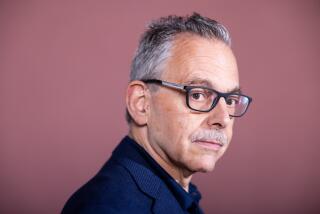Service in Cause of Civility
- Share via
Richard J. Mouw, president of Fuller Theological Seminary in Pasadena, tells a story about pulling into a parking space at a Vons supermarket in La Canada, only to have another driver jam on her horn and make an obscene gesture.
Mouw was sure he hadn’t done anything to earn her ire. The spot was open; he had not seen anyone going for it. Still, in deference to her fury, the 62-year-old philosopher walked over and said he was sorry to have upset her.
“You don’t know what kind of day I’ve had,” Mouw says she told him, and then she started to cry.
For Mouw, an ethicist and scholar steeped in the teachings of Reformation theologian John Calvin, the encounter was a metaphor for the times: Under the weight of life’s pressures, some people are falling apart in public. And civility, which Mouw describes as “public politeness,” has become a rare commodity. This subject is dear to the heart of the man who once wrote a book called “Uncommon Decency: Christian Civility in an Uncivil World” and whose personal hallmark is graciousness.
Civility, Mouw says, requires us to show tact, moderation, refinement and good manners toward people who are different from us. But civility also has an inner side--the struggle to get beyond our own perceptions, to see fellow human beings as creatures made in God’s image, no matter how defaced and damaged they may appear.
“Every human being is a work of divine art,” he says. “I can learn a lot about how to treat an unlikable person with reverence if I keep reminding myself of the value the person has in the eyes of God.”
Civility may be in short supply in 21st century Los Angeles, where motorists get honked at for obeying the speed limit. But Mouw believes that civility, like art appreciation, can be cultivated. “The family meal is the primary workshop in civility,” he says, “where [sometimes] you sit with people you’re angry with, and you hang in there for 45 minutes because you can’t leave the table.”
Today, many Americans “graze” rather than eat at the table at a designated time because family members are busy pursuing their own interests and schedules, he observes. To Mouw, this requires people to make a point of finding ways to ask, “Is this the real story we want to be writing about our lives?” Churches, he thinks, could play a vital role by acting as “families” for people without families, by opening their doors for weekly suppers, reminiscent of simpler times.
Mouw, who has been president of Fuller for nine years, is an evangelical Presbyterian with conservative leanings on such issues as abortion, but is also a social activist committed to working with the poor and eradicating injustice. He says his activism dates to the anti-Vietnam War protests of the 1960s, when he was working on his doctorate at the University of Chicago.
Later, as a professor at Calvin College in Grand Rapids, Mich., he and three other white professors and their families lived in a largely black urban neighborhood for 15 years. Mouw says the experience had a profound influence on his thinking. “We’ve got to go out there and be alongside of people who are dying of AIDS,” he says, “alongside of people who are feeling terribly depressed because their marriages are breaking up, or they can’t communicate with their kids, or they’re wrestling with sexual temptations, or they’re worrying about economic problems.”
Evangelicals, motivated by a desire to spread the word, have been better at talking about the power of God to transform individuals than tackling social-justice issues, he says. “We evangelicals have been orally compulsive and behaviorally immature,” and have lost credibility as a result.
Those kinds of observations win respect from political scientist Alan Wolfe, director of the Boisi Center for Religion and American Public Life at Boston College.
“I think Richard Mouw could play a major role in America by taking a public profile in demonstrating the complexities of the evangelical faith so that it isn’t reduced to stereotypes,” Wolfe says.
The Rev. Bill Dyrness, former dean of Fuller’s School of Theology, has known Mouw more than two decades. He says Mouw has a rare ability to combine deep faith with learning and ecumenical interests. “His greatest gift is his ability to communicate.... Even though he is a very well-educated person and a scholar, he could relate just as easily to people who are very uneducated,” Dyrness says.
Fuller Seminary holds an unusual place in the training of pastors, missionaries, psychologists, community leaders and Christian workers. Its student body of just under 4,000 represents 120 denominations and more than 60 countries. It is believed to be the world’s largest multidenominational seminary.
At this year’s June 15 commencement, 500 future Christian leaders will receive degrees ranging from master of divinity to doctorates in theology and psychology. Since the seminary was founded by evangelist Charles E. Fuller in 1947, nearly 20,000 have graduated.
Rabbi Elliot N. Dorff, rector at the University of Judaism, jokes that Mouw looks too happy to be a “true Calvinist,” to which Mouw replies: “It sure helps to know that in spite of all of my sins, I am forgiven by a loving God.”
Despite his administrative duties, Mouw continues to teach. His big course is “Christian Worldview and Contemporary Challenges.” Ever mindful of the influence of Hollywood, he stays in touch with the entertainment industry. Some eyebrows were raised in April when Fuller opened its doors to a film festival and gave actor Rod Steiger an award. “We need to be in dialogue with Hollywood,” Mouw says, “not only to criticize, but to learn more from their insight into the culture. Seminaries need to be out there on the front lines in dialogue with people who are wrestling with the issues in culture, not just dismissing the whole industry as nothing but a pagan consumerist catering to popular taste.”
He never misses three TV shows--”Alias”, “24” and “The West Wing”--taping them so he can watch on his exercise bike. He has even watched the Jerry Springer show, crying over the pain of people like the woman who learns on air that her husband has been sleeping with her sister.
The incivility that is flaunted on shows like Springer’s, Howard Stern’s and the World Wrestling Federation’s is having a pernicious influence in the daily lives of many people, he says. But at the same time he asks himself: “Are any of the things we find so easy to condemn in our culture caused by the failure of the church?” At crucial points, when he has had to make tough decisions, he says, he has asked God: “Just help me not to stand in the way of all the good things that could be happening here.”


